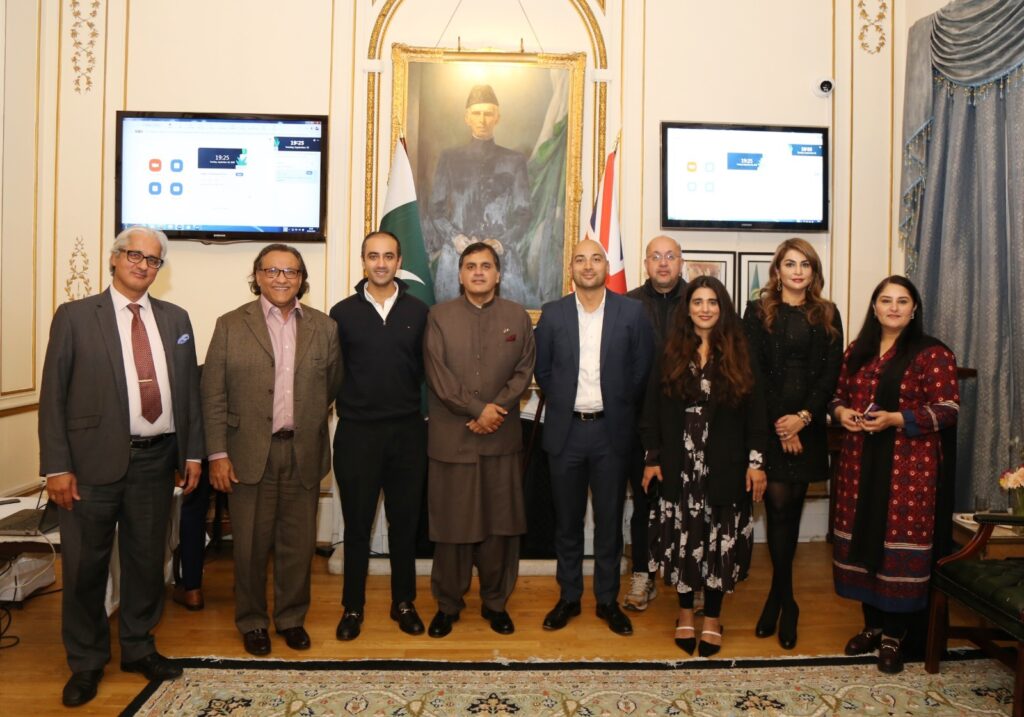Pilot projects for Electronic Medical Record (EMR) systems in major hospitals, starting from Islamabad, to be implemented with public-private partnership in AI and Health
The High Commission of Pakistan in London, hosted a high-level workshop on “Leveraging AI in Healthcare in Pakistan”, bringing together policy makers, AI experts, medical professionals, and academics from the UK and Pakistan.
The session was opened by the High Commissioner, who underscored the transformative potential of Artificial Intelligence to improve healthcare governance, diagnostics, electronic medical records, and medical education in Pakistan. In his pre-recorded keynote address the Federal Minister for National Health Services, Regulations & Coordination, Dr. Syed Mustafa Kamal, emphasised the need to embrace modern technologies and AI to improve public healthcare in Pakistan. In his remarks, Dr. Zubir Ahmed MP, Parliamentary Under-Secretary of State at the UK Department of Health and Social Care, shared UK’s experience in integrating innovation and AI to enhance health equity and access.
A distinguished line-up of speakers spoke on a range of critical themes. Mr. Abu Bakar, CEO of the Pakistan Software Export Board (PSEB), shared his vision for digital transformation and enabling health technology innovation in Pakistan. Ms. Ayesha Hussain, Data Governance Lead at University of Leeds, discussed responsible AI and data quality frameworks to ensure affordable, accessible, and high-quality healthcare delivery. Mr. Omer Butt, Co-founder of Vita Healthcare Solutions, built a case for AI use-cases that reduce waiting times and treatment delays, while addressing inequities in care delivery. Dr. Mahdi Murtaza – a young doctor – presented a pathway to leverage AI for primary care transformation in Pakistan and development of AI curriculum for medical professionals.
Dr. Suhail Chughtai, Clinical Director for Orthopaedics & Trauma, London, and AI Division Chair at UK Digital Health & Care, spoke about developing an AI-enabled Electronic Medical Records (EMR) system for Pakistan. Professor Jawwad Arshad Darr, Vice Dean of Enterprise at UCL’s MAPS Faculty and Co-founder of UPSIGN, presented strategies for training and developing academic capacity for AI research in Pakistan. Dr. Shahid Latif, Chair of the British Pakistani Psychiatrists Association, focused on AI in mental health care, while Ms. Zehra Shah, CEO of OPEN London, spoke about responsible AI in healthcare and its ethical implications. The discussion concluded with Mr. Rehman Qamar, Chief Project Officer at NADRA, who highlighted how NADRA’s citizen database could underpin secure, scalable digital health systems and EMR integration in Pakistan.
Participants agreed on several key outcomes, including the need for a national AI-enabled health data strategy, public-private partnership in AI and Health, the piloting of EMR systems in major hospitals, and the development of AI training curricula for medical professionals. They noted that building a Responsible AI Framework in Healthcare, which embeds Responsible AI principles into AI Applications and processes, was a must. They also agreed to re-convene to discuss other aspects of AI in healthcare in coming days.
The High Commissioner reaffirmed its commitment to present these recommendations to the stakeholders in Islamabad, ensuring that Pakistan could harness AI to deliver better healthcare for every citizen.
London, 24th September 2025
